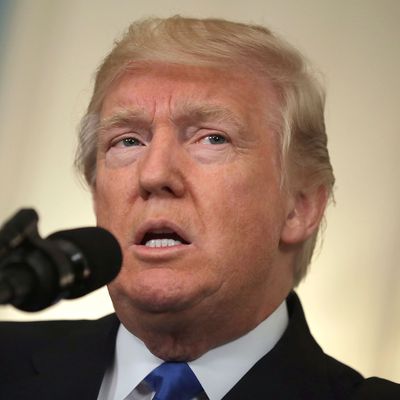
Deputy Attorney General Rod Rosenstein is not known for issuing cryptic denunciations of the news media. Donald Trump is.
So, when Rosenstein released the following statement Thursday night, many suspected he was just following orders — or, at least, trying not to conspicuously disobey them. (The Trump administration denies this, but then, they deny a lot of things.)
Americans should exercise caution before accepting as true any stories attributed to anonymous ‘officials,’ particularly when they do not identify the country — let alone the branch or agency of government — with which the alleged sources supposedly are affiliated.
If Rosenstein was trying to appease Trump, he did not succeed: On Friday morning, the president publicly suggested that the deputy attorney general had joined the conspiracy against him.
To review: Last month, Trump decided he wanted to fire James Comey because he disapproved of the FBI director’s handling of the investigation into his campaign. He then asked the Justice Department to provide some advice on the matter (a.k.a. an aboveboard rationalization for Comey’s firing).
Rosenstein agreed to write a scathing memo about Comey’s handling of the Clinton investigation — one that never quite recommended the FBI director’s dismissal. The White House then spent a couple days suggesting that Trump only fired Comey because Rosenstein advised him to.
Rosenstein was not pleased by this. And, apparently, neither was the president, who went on national television and declared, “I was going to fire him regardless of recommendation … And in fact, when I decided to just do it, I said to myself, I said, ‘You know, this Russia thing with Trump and Russia is a made-up story.’”
Trump has now, apparently, decided that he prefers the White House’s first story.
So, that’s one part of the case for believing Trump is referring to Rosenstein here. The other is this: The president has reportedly spent a good deal of time in recent weeks berating Jeff Sessions for recusing himself from the Russia probe. Trump believes all his current troubles stem from that decision. The president has treated his attorney general to so much vitriol, Sessions reportedly offered to tender his resignation.
Now, if Trump is that angry at the man who passively enabled the appointment of a special prosecutor, how must he feel about the one who actually decided to pull that trigger, one Rod Rosenstein?
Earlier this week, we learned that Trump has discussed firing special prosecutor Robert Mueller with friends and family. At present, Rosenstein is in charge of overseeing Mueller’s investigation. In that capacity, Rosenstein has the power to determine what resources and personnell Mueller has at his disposal – and, ultimately, whether or not the Justice Department pursues prosecutions on the basis of his findings.
On Tuesday, he assured the Senate that he would refuse to follow an order to fire the special counsel, unless he believed it was given for good cause.
“I’m not going to follow any orders unless I believe those are lawful and appropriate orders,” the deputy attorney general said. “If there were good cause I would consider it. If there were not good cause, it wouldn’t matter to me what anybody says.”
In other words: Trump is going to have to fire Rosenstein if he wants to fire Mueller.
Unless, that is, Rosenstein sidelines himself. On Friday morning, ABC News reported that the deputy attorney general has privately told colleagues he may have to recuse himself from Mueller’s probe. This makes some sense: One subject of Mueller’s investigation concerns whether Trump’s firing of James Comey constituted an obstruction of justice. Rosenstein played a critical role in that firing, and may be required as a witness. Were Rosenstein to step aside, authority over the probe would fall to Rachel Brand, a member of the arch-conservative Federalist Society, and former Bush administration official.
Regardless, Trump probably wants to fire Mueller now more than he ever has. In the last 72 hours, the Washington Post and the New York Times reported the Mueller’s curiosity about obstruction of justice charges, while the Post also revealed that the special counsel is examining Jared Kushner’s financial dealings with Russian entities.
All of which is to say: Rod Rosenstein’s job is in jeopardy; as is Robert Mueller’s; as is the rule of law in the United States.






























